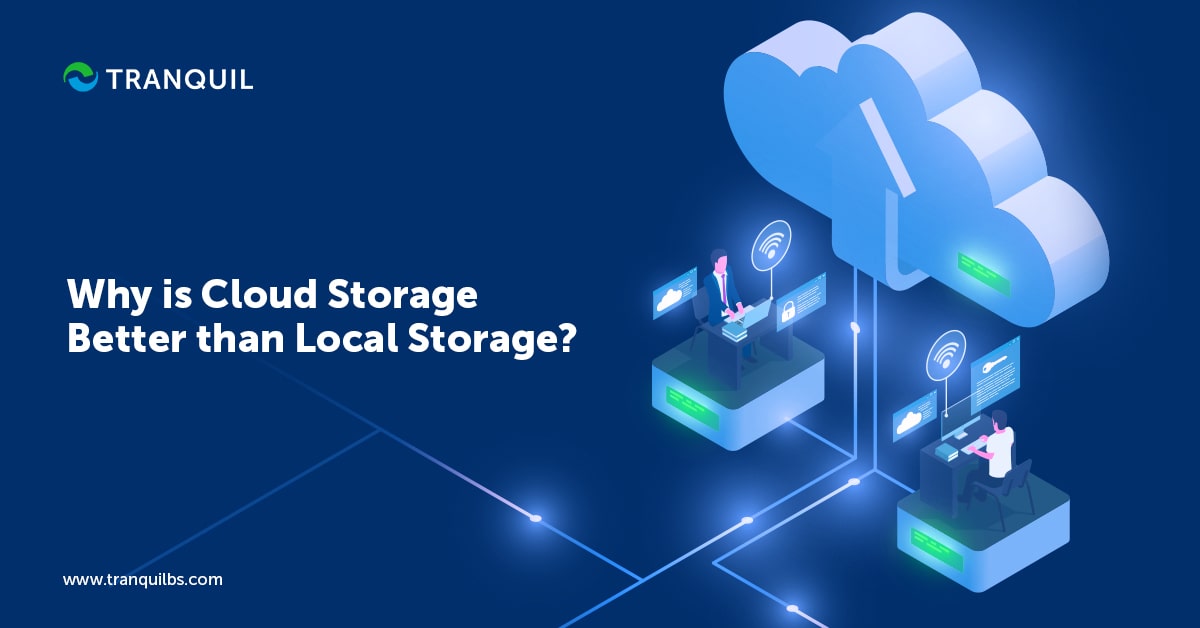
Technological advances are taking place rapidly nowadays.
There are revolutionary methods emerging in every aspect of IT, and this includes storage.
IT professionals are looking at all possible solutions for data storage.
Why is this?
With newer and more advanced technology, more storage is required, as there are a large number of files that take up more space.
When device storage is full or nearly so, it can hamper the performance of your computer.
To overcome this hurdle, today we have cloud storage.
ALSO READ: What Is Cloud Data Protection?
What exactly is cloud storage?
It simply means storing your files on multiple remote servers that are maintained by third parties.
These can be accessed and even backed up via any device that is connected to the internet.
The biggest advantage this method of storage offers, is scalability, as it overcomes the issue of inadequate space on your devices.
We have seen that cloud storage refers to storing of files on several servers in remote locations.
Local storage means storing data on local servers – that is, services that are usually on your premises.
Both methods of storage have their own pros and cons.
For example, response time is faster in local storage, but cloud storage can be accessed from anywhere.
Overall, cloud storage is more cost-effective and scalable than local storage, and that is the main difference between cloud storage and local storage.
ALSO READ: On-Premise or Cloud Database Hosting

Cloud storage offers innumerable advantages over local storage.
Let’s check them out:
Data stored in the cloud offers hands-off management; that is, little to no human intervention for backing up.
It is automatically backed up at specific intervals.
Even if your own computer hard disk crashes, your data is safe in the cloud, on the remote servers.
You don’t need to physically carry your files from one location to the next as cloud data can be accessed from any device.
All you need to do is make sure that it is connected to the internet.
Remote data storage facilitates remote working and hybrid working, allowing employees to work from wherever they are, and use whatever device they want to.
ALSO READ: ERP vs CRM
Cloud storage is extremely flexible, allowing you to scale up or down as per your business requirements.
If your users decrease, you can scale it down and save money.
Whenever you need to add more users, you can do so easily.
You only have to pay for the resources that you use.
Thanks to the regular backing up of cloud storage data, you can rest assured even when there is a breakdown or hardware failure.
Disaster recovery is much simpler and quicker in the cloud, and what’s more, you don’t have to worry about doing it yourself.
When you use cloud storage, you don’t require an on-site server, which means you can outsource the maintenance task to the cloud.
This in turn brings down your expenses which you would have incurred if you had to do on-premise maintenance.
ALSO READ: How Do ERP and Cloud Computing Differ?

As with any other technology or methodology, cloud storage also has a few disadvantages. So let us take a look at what they are:

Misconfiguration is the biggest vulnerability of cloud storage, and these misconfigurations can lead to data breaches as the accessibility is not properly secured and managed.
In such cases, employees or hackers can gain access to sensitive information that can cause a substantial breach of data.
Poor access control and absence of stringent restrictions can cause non-compliance by the business, with standards like HIPAA or Health Insurance Portability and Accountability Act and PCI-DSS or Payment Card Industry-Data Security Standard.
APIs or application programming interfaces open up communication channels, and can leave the app vulnerable to attacks.
On top of it when there are no stringent authentication or authorization measures, they can be exploited easily.
Basically, wherever there is poor management of access or lack of role-based control of access, or where there is absence of a policy to disable or delete accounts of inactive and former employees, there is likely to be a high risk of vulnerability.
ALSO READ: Factors for a Successful ERP Implementation
The first thing to do to mitigate vulnerabilities, is recognizing the issues.
You can make use of a tool to scan vulnerabilities to detect the CVEs or the most common vulnerabilities and exposures.
After identifying the CVEs, use a vulnerability checklist to evaluate the risks.
Once the assessment is completed, the IT department can fix the riskiest vulnerabilities, or they can try and reduce the severity of the risk.
It can also happen sometimes, that some vulnerabilities may not pose any threat; in such a case, no action is required to be taken.
The next step after performing all corrective measures, is to run a vulnerability scan to churn out a report on vulnerability assessment to detect the weak links in APIs and web apps.
You can also run a penetration test to identify vulnerabilities before they can be exploited by hackers.
It is advisable to run the scanning program on a regular basis to ensure that there are no potential weak links or vulnerabilities.
ALSO READ: What is Dead Stock – How Can You Avoid It?
Vulnerabilities that are present in cloud storage are also applicable to local storage.
Regardless of the type of storage your business uses, you need to have a proper plan in place for disaster recovery, take backups, sophisticated anti-virus and anti-malware software tools, along with access plans of minimal privilege.
All these measures will help in detecting abnormal traffic and behavior of files.

Let us understand this with the help of a table. You will see here that in almost every cost category, the cloud solution costs less than the solution offered by local storage.
In only one category, as there is an unknown variable – that is, the amount of actual storage space that will be required to support the requirements of business data – the benefit of the doubt is given to the local storage method.
You can use available tools like TCO calculators from various vendors to estimate how much it will cost you to store your data on the premises, what your network bandwidth requirements are, and how much CPU you will need.
ALSO READ: Detailed Guide to Batch Tracking
| Category of Cost | Cloud Storage | Local Storage | Which is Better? |
|---|---|---|---|
| Initial outlay | Low cost of start-up | High cost of start-up | Cloud |
| Maintenance Expenses | Very low cost of maintenance | Very High fees for maintenance | Cloud |
| Storage | Terabyte storage forms part of the monthly fee | It depends on the space needed; If less than 1TB is needed, local is better | Subjective; Depends on local storage space requirements |
| Scaling Capabilities | Easily scale up or down as per requirements | Limited scalability and tends to be costly | Cloud |
| Security | Security is built-in | Requires trained IT staff or outsourcing | Cloud |
Hence, we can see that when it comes to the total Cost of Ownership, Cloud storage cost tends to be lesser than local storage on the whole
In these intensely competitive times, it is critical that you have access to important business information as and when it is required, to close deals or provide good customer service.
Having this access gives you a tremendous competitive advantage, scalability, and flexibility – everything that is important for business success.
Here we can see that cloud storage allows you to do all of this – which makes it preferable over local storage.
After all, how many hard drives will you keep adding to your IT infrastructure?
ALSO READ: Why Tranquil is One of the Most Trusted ERP Solution Providers in GCC?
Tranquil ERP is a cloud-based business solution that gets rid of information silos, unifies data from all your departments, and stores it in a central base, offering controlled access to relevant employees, to empower them with information when it is most needed.
Tranquil helps to streamline and automate all your business processes, increasing efficiency and productivity, and boosting your revenue.
It is flexible and scalable and capable of handling the extra workload every time you add new products, customers, employees, locations, currencies, and increased transactions.
Our application is user-friendly and secure, and we take every precaution to safeguard your sensitive business information.
We draw up SLAs where we establish clearly, matters like disaster recovery time, and we stringently adhere to them.
This helps to ensure that the downtime and business disruption is kept to a minimum and that there is business continuity.
We help you manage your customer expectations with this service.
It is economical for you as a business and delivers multiple benefits.
ALSO READ: Different Ways to Improve the Procurement Process
If you are unsure of how our solution can benefit your business, we would love to show you how! Do schedule a FREE demo at a day and time of your convenience, and we will walk you through the software. Our representatives will be happy to answer any query you may have regarding its functions.